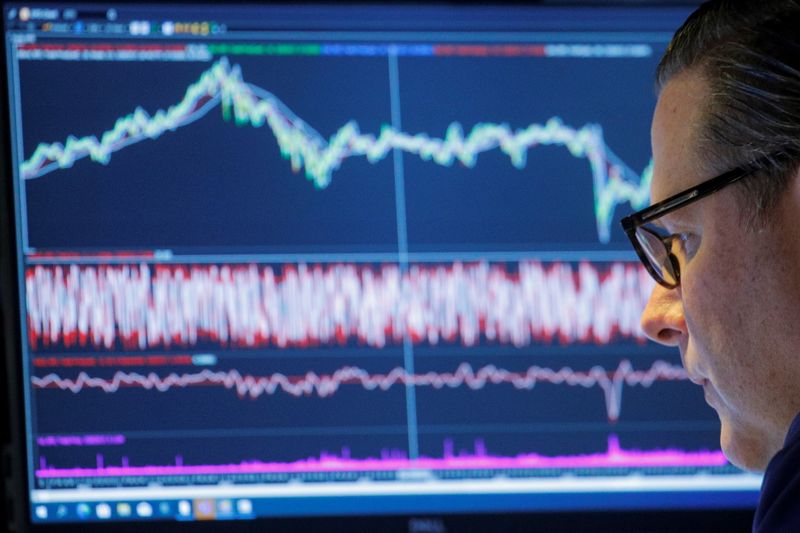By Geoffrey Smith
Investing.com -- Bond yields rise to fresh three-year highs ahead of potentially dramatic U.S. inflation numbers on Tuesday. There's the usual host of Fed speakers ready to comment on that. Elon Musk changes his mind about joining Twitter's board and continues to snipe about the social media company on its own platform. Emmanuel Macron is set for a tight run-off against right-wing leader Marine Le Pen in France's presidential elections, and Russia relaxes capital controls as the west's sanctions prove to be more bark than bite. Here's what you need to know in financial markets on Monday, 11th April.
1. Bond yields hit news highs ahead of March CPI data
The bellwether 10-Year U.S. bond yield hit 2.75% for the first time since March 2019, at the start of a week likely to be dominated by consumer inflation data for March, which are set to post another 40-year high.
By 6:15 AM ET (1015 GMT), the 10-year was at 2.75%, having eased 3 basis points from its overnight high. The 2-Year yield, which is more sensitive to expectations for short-term interest rates, was up 6 basis points from late Friday at 2.58%.
Ahead of Tuesday’s data, there will be another salvo of Fed-speak: regional presidents Raphael Bostic, John Williams and Charles Evans are all due to speak in the course of the day, as is DC-based governor Michelle Bowman.
The global inflation phenomenon was in evidence overnight: Chinese producer and consumer prices both came in ahead of expectations, although were off their peaks. China’s credit aggregates and money supply also grew more strongly than expected in March. The central bank is still expected to announce an easing of monetary policy in the course of this week, however.
2. Musk jilts Twitter board
Elon Musk won’t be joining Twitter’s board after all. CEO Parag Agrawal said on Saturday that Musk had declined the board’s offer of a seat, hinting that there was too much of a conflict between the board’s goals and the Tesla CEO’s.
Twitter (NYSE:TWTR) stock fell over 4% in premarket trading, having risen as much as 25% last week in response to the news that Musk had built a stake of 9.2%.
It’s not clear how Musk intends to proceed now. He has styled his holding as ‘passive’ but spent much of last week and the weekend tweeting about how the company could improve its service and its financials. An ‘activist’ investor is usually required to disclose more about his or her intentions through the usual regulatory channels. Musk – whose activity on the site has already brought him grief from the SEC more than once - hasn’t done that yet.
3. Stocks set to open lower; Nio suspends production
U.S. stock markets are set to open lower later, amid ongoing unease at the rise in bond yields and their ability to generate some unpleasant surprises in the upcoming first quarter earnings season.
JPMorgan (NYSE:JPM) and others get that ball rolling on Wednesday.
By 6:15 AM ET, Dow Jones futures were down 15 points, or less than 0.1%, but S&P 500 futures were down 0.3%, and Nasdaq 100 futures were down 0.7%.
The NASDAQ came under renewed pressure last week as the need to factor higher discount rates into stock valuations again weighed disproportionately on technology stocks who aren’t expected to generate positive cash flow for some years yet.
Stocks likely to be in focus later include the ADRs of Chinese electric vehicle maker Nio (NYSE:NIO), which said at the weekend it will suspend production due to COVID-19 lockdown-related disruptions. It’s also raising prices for its three SUV models. Also in focus will be JetBlue (NASDAQ:JBLU), which pruned its summer schedule at the weekend in an effort to cut the risk of disruptions.
4. Macron set for tight run-off with Le Pen
Incumbent Emmanuel Macron emerged on top from the first round of voting in France’s Presidential elections, just under four points ahead of the populist right-wing leader Marine Le Pen.
The two will now face off in a second round of voting in two weeks’ time. Macron had won a similar face-off by 66%-34% in 2017 but faces a much tighter contest this time after Le Pen scored heavily with a campaign that focused on the cost-of-living crisis and on Macron’s unpopular plans to raise the pension age.
Eurozone bond markets and the euro itself both staged a modest relief rally, mindful that Le Pen has the greater momentum. Opinion polls suggest that she has narrowed the gap to Macron from over 30% a month ago to less than 4% now.
Elsewhere in Europe, Germany waved through the creation of financial support measures for its energy companies, while data showed the U.K. economy slowed to a crawl in February.
5. Russia relaxes capital controls
Russia’s central bank relaxed some of its most onerous capital controls in a further sign that its economy is adapting to the sanctions imposed on it by the U.S., EU, U.K., Japan, and Australia.
The central bank will suspend the 12% surcharge on foreign exchange transactions that it had imposed at the end of February to stop panic buying of dollars and euros by the population.
The ruble’s official rate fell some 2.6% in response, but its signal value has been undermined by the sanctions, which still restrict the free buying and selling of currency. Elsewhere, the French bank Societe Generale (PA:SOGN) effectively gave back its Russian unit Rosbank to its original owner, the oligarch Vladimir Potanin.
